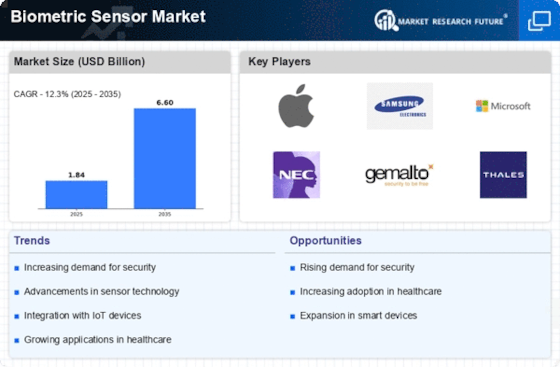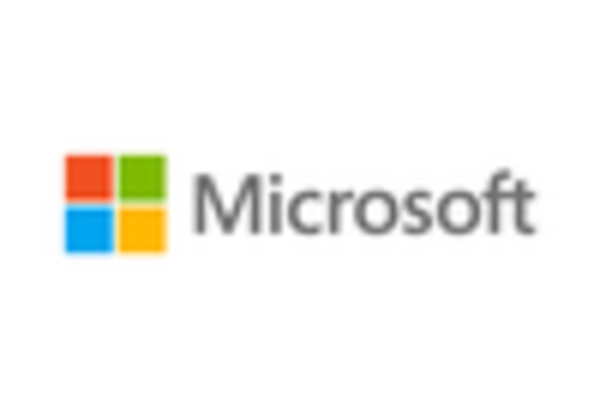Fingerprint Sensors
Face Recognition Sensors
Iris Recognition Sensors
Voice Recognition Sensors
Vein Recognition Sensors
Capacitive Sensors
Optical Sensors
Ultrasound Sensors
Infrared Sensors
RFID Sensors
Access Control
Time and Attendance
Identity Verification
Smartphones and Tablets
Banking and Payment
Government
Healthcare
Retail
Banking and Financial Services
Consumer Electronics
North America
Europe
South America
Asia Pacific
Middle East and Africa
North America Outlook (USD Billion, 2019-2035)
North America Biometric Sensor Market by Sensor Type
Fingerprint Sensors
Face Recognition Sensors
Iris Recognition Sensors
Voice Recognition Sensors
Vein Recognition Sensors
North America Biometric Sensor Market by Technology Type
Capacitive Sensors
Optical Sensors
Ultrasound Sensors
Infrared Sensors
RFID Sensors
North America Biometric Sensor Market by Application Type
Access Control
Time and Attendance
Identity Verification
Smartphones and Tablets
Banking and Payment
North America Biometric Sensor Market by End Use Type
Government
Healthcare
Retail
Banking and Financial Services
Consumer Electronics
North America Biometric Sensor Market by Regional Type
US
Canada
US Outlook (USD Billion, 2019-2035)
US Biometric Sensor Market by Sensor Type
Fingerprint Sensors
Face Recognition Sensors
Iris Recognition Sensors
Voice Recognition Sensors
Vein Recognition Sensors
US Biometric Sensor Market by Technology Type
Capacitive Sensors
Optical Sensors
Ultrasound Sensors
Infrared Sensors
RFID Sensors
US Biometric Sensor Market by Application Type
Access Control
Time and Attendance
Identity Verification
Smartphones and Tablets
Banking and Payment
US Biometric Sensor Market by End Use Type
Government
Healthcare
Retail
Banking and Financial Services
Consumer Electronics
CANADA Outlook (USD Billion, 2019-2035)
CANADA Biometric Sensor Market by Sensor Type
Fingerprint Sensors
Face Recognition Sensors
Iris Recognition Sensors
Voice Recognition Sensors
Vein Recognition Sensors
CANADA Biometric Sensor Market by Technology Type
Capacitive Sensors
Optical Sensors
Ultrasound Sensors
Infrared Sensors
RFID Sensors
CANADA Biometric Sensor Market by Application Type
Access Control
Time and Attendance
Identity Verification
Smartphones and Tablets
Banking and Payment
CANADA Biometric Sensor Market by End Use Type
Government
Healthcare
Retail
Banking and Financial Services
Consumer Electronics
Europe Outlook (USD Billion, 2019-2035)
Europe Biometric Sensor Market by Sensor Type
Fingerprint Sensors
Face Recognition Sensors
Iris Recognition Sensors
Voice Recognition Sensors
Vein Recognition Sensors
Europe Biometric Sensor Market by Technology Type
Capacitive Sensors
Optical Sensors
Ultrasound Sensors
Infrared Sensors
RFID Sensors
Europe Biometric Sensor Market by Application Type
Access Control
Time and Attendance
Identity Verification
Smartphones and Tablets
Banking and Payment
Europe Biometric Sensor Market by End Use Type
Government
Healthcare
Retail
Banking and Financial Services
Consumer Electronics
Europe Biometric Sensor Market by Regional Type
Germany
UK
France
Russia
Italy
Spain
Rest of Europe
GERMANY Outlook (USD Billion, 2019-2035)
GERMANY Biometric Sensor Market by Sensor Type
Fingerprint Sensors
Face Recognition Sensors
Iris Recognition Sensors
Voice Recognition Sensors
Vein Recognition Sensors
GERMANY Biometric Sensor Market by Technology Type
Capacitive Sensors
Optical Sensors
Ultrasound Sensors
Infrared Sensors
RFID Sensors
GERMANY Biometric Sensor Market by Application Type
Access Control
Time and Attendance
Identity Verification
Smartphones and Tablets
Banking and Payment
GERMANY Biometric Sensor Market by End Use Type
Government
Healthcare
Retail
Banking and Financial Services
Consumer Electronics
UK Outlook (USD Billion, 2019-2035)
UK Biometric Sensor Market by Sensor Type
Fingerprint Sensors
Face Recognition Sensors
Iris Recognition Sensors
Voice Recognition Sensors
Vein Recognition Sensors
UK Biometric Sensor Market by Technology Type
Capacitive Sensors
Optical Sensors
Ultrasound Sensors
Infrared Sensors
RFID Sensors
UK Biometric Sensor Market by Application Type
Access Control
Time and Attendance
Identity Verification
Smartphones and Tablets
Banking and Payment
UK Biometric Sensor Market by End Use Type
Government
Healthcare
Retail
Banking and Financial Services
Consumer Electronics
FRANCE Outlook (USD Billion, 2019-2035)
FRANCE Biometric Sensor Market by Sensor Type
Fingerprint Sensors
Face Recognition Sensors
Iris Recognition Sensors
Voice Recognition Sensors
Vein Recognition Sensors
FRANCE Biometric Sensor Market by Technology Type
Capacitive Sensors
Optical Sensors
Ultrasound Sensors
Infrared Sensors
RFID Sensors
FRANCE Biometric Sensor Market by Application Type
Access Control
Time and Attendance
Identity Verification
Smartphones and Tablets
Banking and Payment
FRANCE Biometric Sensor Market by End Use Type
Government
Healthcare
Retail
Banking and Financial Services
Consumer Electronics
RUSSIA Outlook (USD Billion, 2019-2035)
RUSSIA Biometric Sensor Market by Sensor Type
Fingerprint Sensors
Face Recognition Sensors
Iris Recognition Sensors
Voice Recognition Sensors
Vein Recognition Sensors
RUSSIA Biometric Sensor Market by Technology Type
Capacitive Sensors
Optical Sensors
Ultrasound Sensors
Infrared Sensors
RFID Sensors
RUSSIA Biometric Sensor Market by Application Type
Access Control
Time and Attendance
Identity Verification
Smartphones and Tablets
Banking and Payment
RUSSIA Biometric Sensor Market by End Use Type
Government
Healthcare
Retail
Banking and Financial Services
Consumer Electronics
ITALY Outlook (USD Billion, 2019-2035)
ITALY Biometric Sensor Market by Sensor Type
Fingerprint Sensors
Face Recognition Sensors
Iris Recognition Sensors
Voice Recognition Sensors
Vein Recognition Sensors
ITALY Biometric Sensor Market by Technology Type
Capacitive Sensors
Optical Sensors
Ultrasound Sensors
Infrared Sensors
RFID Sensors
ITALY Biometric Sensor Market by Application Type
Access Control
Time and Attendance
Identity Verification
Smartphones and Tablets
Banking and Payment
ITALY Biometric Sensor Market by End Use Type
Government
Healthcare
Retail
Banking and Financial Services
Consumer Electronics
SPAIN Outlook (USD Billion, 2019-2035)
SPAIN Biometric Sensor Market by Sensor Type
Fingerprint Sensors
Face Recognition Sensors
Iris Recognition Sensors
Voice Recognition Sensors
Vein Recognition Sensors
SPAIN Biometric Sensor Market by Technology Type
Capacitive Sensors
Optical Sensors
Ultrasound Sensors
Infrared Sensors
RFID Sensors
SPAIN Biometric Sensor Market by Application Type
Access Control
Time and Attendance
Identity Verification
Smartphones and Tablets
Banking and Payment
SPAIN Biometric Sensor Market by End Use Type
Government
Healthcare
Retail
Banking and Financial Services
Consumer Electronics
REST OF EUROPE Outlook (USD Billion, 2019-2035)
REST OF EUROPE Biometric Sensor Market by Sensor Type
Fingerprint Sensors
Face Recognition Sensors
Iris Recognition Sensors
Voice Recognition Sensors
Vein Recognition Sensors
REST OF EUROPE Biometric Sensor Market by Technology Type
Capacitive Sensors
Optical Sensors
Ultrasound Sensors
Infrared Sensors
RFID Sensors
REST OF EUROPE Biometric Sensor Market by Application Type
Access Control
Time and Attendance
Identity Verification
Smartphones and Tablets
Banking and Payment
REST OF EUROPE Biometric Sensor Market by End Use Type
Government
Healthcare
Retail
Banking and Financial Services
Consumer Electronics
APAC Outlook (USD Billion, 2019-2035)
APAC Biometric Sensor Market by Sensor Type
Fingerprint Sensors
Face Recognition Sensors
Iris Recognition Sensors
Voice Recognition Sensors
Vein Recognition Sensors
APAC Biometric Sensor Market by Technology Type
Capacitive Sensors
Optical Sensors
Ultrasound Sensors
Infrared Sensors
RFID Sensors
APAC Biometric Sensor Market by Application Type
Access Control
Time and Attendance
Identity Verification
Smartphones and Tablets
Banking and Payment
APAC Biometric Sensor Market by End Use Type
Government
Healthcare
Retail
Banking and Financial Services
Consumer Electronics
APAC Biometric Sensor Market by Regional Type
China
India
Japan
South Korea
Malaysia
Thailand
Indonesia
Rest of APAC
CHINA Outlook (USD Billion, 2019-2035)
CHINA Biometric Sensor Market by Sensor Type
Fingerprint Sensors
Face Recognition Sensors
Iris Recognition Sensors
Voice Recognition Sensors
Vein Recognition Sensors
CHINA Biometric Sensor Market by Technology Type
Capacitive Sensors
Optical Sensors
Ultrasound Sensors
Infrared Sensors
RFID Sensors
CHINA Biometric Sensor Market by Application Type
Access Control
Time and Attendance
Identity Verification
Smartphones and Tablets
Banking and Payment
CHINA Biometric Sensor Market by End Use Type
Government
Healthcare
Retail
Banking and Financial Services
Consumer Electronics
INDIA Outlook (USD Billion, 2019-2035)
INDIA Biometric Sensor Market by Sensor Type
Fingerprint Sensors
Face Recognition Sensors
Iris Recognition Sensors
Voice Recognition Sensors
Vein Recognition Sensors
INDIA Biometric Sensor Market by Technology Type
Capacitive Sensors
Optical Sensors
Ultrasound Sensors
Infrared Sensors
RFID Sensors
INDIA Biometric Sensor Market by Application Type
Access Control
Time and Attendance
Identity Verification
Smartphones and Tablets
Banking and Payment
INDIA Biometric Sensor Market by End Use Type
Government
Healthcare
Retail
Banking and Financial Services
Consumer Electronics
JAPAN Outlook (USD Billion, 2019-2035)
JAPAN Biometric Sensor Market by Sensor Type
Fingerprint Sensors
Face Recognition Sensors
Iris Recognition Sensors
Voice Recognition Sensors
Vein Recognition Sensors
JAPAN Biometric Sensor Market by Technology Type
Capacitive Sensors
Optical Sensors
Ultrasound Sensors
Infrared Sensors
RFID Sensors
JAPAN Biometric Sensor Market by Application Type
Access Control
Time and Attendance
Identity Verification
Smartphones and Tablets
Banking and Payment
JAPAN Biometric Sensor Market by End Use Type
Government
Healthcare
Retail
Banking and Financial Services
Consumer Electronics
SOUTH KOREA Outlook (USD Billion, 2019-2035)
SOUTH KOREA Biometric Sensor Market by Sensor Type
Fingerprint Sensors
Face Recognition Sensors
Iris Recognition Sensors
Voice Recognition Sensors
Vein Recognition Sensors
SOUTH KOREA Biometric Sensor Market by Technology Type
Capacitive Sensors
Optical Sensors
Ultrasound Sensors
Infrared Sensors
RFID Sensors
SOUTH KOREA Biometric Sensor Market by Application Type
Access Control
Time and Attendance
Identity Verification
Smartphones and Tablets
Banking and Payment
SOUTH KOREA Biometric Sensor Market by End Use Type
Government
Healthcare
Retail
Banking and Financial Services
Consumer Electronics
MALAYSIA Outlook (USD Billion, 2019-2035)
MALAYSIA Biometric Sensor Market by Sensor Type
Fingerprint Sensors
Face Recognition Sensors
Iris Recognition Sensors
Voice Recognition Sensors
Vein Recognition Sensors
MALAYSIA Biometric Sensor Market by Technology Type
Capacitive Sensors
Optical Sensors
Ultrasound Sensors
Infrared Sensors
RFID Sensors
MALAYSIA Biometric Sensor Market by Application Type
Access Control
Time and Attendance
Identity Verification
Smartphones and Tablets
Banking and Payment
MALAYSIA Biometric Sensor Market by End Use Type
Government
Healthcare
Retail
Banking and Financial Services
Consumer Electronics
THAILAND Outlook (USD Billion, 2019-2035)
THAILAND Biometric Sensor Market by Sensor Type
Fingerprint Sensors
Face Recognition Sensors
Iris Recognition Sensors
Voice Recognition Sensors
Vein Recognition Sensors
THAILAND Biometric Sensor Market by Technology Type
Capacitive Sensors
Optical Sensors
Ultrasound Sensors
Infrared Sensors
RFID Sensors
THAILAND Biometric Sensor Market by Application Type
Access Control
Time and Attendance
Identity Verification
Smartphones and Tablets
Banking and Payment
THAILAND Biometric Sensor Market by End Use Type
Government
Healthcare
Retail
Banking and Financial Services
Consumer Electronics
INDONESIA Outlook (USD Billion, 2019-2035)
INDONESIA Biometric Sensor Market by Sensor Type
Fingerprint Sensors
Face Recognition Sensors
Iris Recognition Sensors
Voice Recognition Sensors
Vein Recognition Sensors
INDONESIA Biometric Sensor Market by Technology Type
Capacitive Sensors
Optical Sensors
Ultrasound Sensors
Infrared Sensors
RFID Sensors
INDONESIA Biometric Sensor Market by Application Type
Access Control
Time and Attendance
Identity Verification
Smartphones and Tablets
Banking and Payment
INDONESIA Biometric Sensor Market by End Use Type
Government
Healthcare
Retail
Banking and Financial Services
Consumer Electronics
REST OF APAC Outlook (USD Billion, 2019-2035)
REST OF APAC Biometric Sensor Market by Sensor Type
Fingerprint Sensors
Face Recognition Sensors
Iris Recognition Sensors
Voice Recognition Sensors
Vein Recognition Sensors
REST OF APAC Biometric Sensor Market by Technology Type
Capacitive Sensors
Optical Sensors
Ultrasound Sensors
Infrared Sensors
RFID Sensors
REST OF APAC Biometric Sensor Market by Application Type
Access Control
Time and Attendance
Identity Verification
Smartphones and Tablets
Banking and Payment
REST OF APAC Biometric Sensor Market by End Use Type
Government
Healthcare
Retail
Banking and Financial Services
Consumer Electronics
South America Outlook (USD Billion, 2019-2035)
South America Biometric Sensor Market by Sensor Type
Fingerprint Sensors
Face Recognition Sensors
Iris Recognition Sensors
Voice Recognition Sensors
Vein Recognition Sensors
South America Biometric Sensor Market by Technology Type
Capacitive Sensors
Optical Sensors
Ultrasound Sensors
Infrared Sensors
RFID Sensors
South America Biometric Sensor Market by Application Type
Access Control
Time and Attendance
Identity Verification
Smartphones and Tablets
Banking and Payment
South America Biometric Sensor Market by End Use Type
Government
Healthcare
Retail
Banking and Financial Services
Consumer Electronics
South America Biometric Sensor Market by Regional Type
Brazil
Mexico
Argentina
Rest of South America
BRAZIL Outlook (USD Billion, 2019-2035)
BRAZIL Biometric Sensor Market by Sensor Type
Fingerprint Sensors
Face Recognition Sensors
Iris Recognition Sensors
Voice Recognition Sensors
Vein Recognition Sensors
BRAZIL Biometric Sensor Market by Technology Type
Capacitive Sensors
Optical Sensors
Ultrasound Sensors
Infrared Sensors
RFID Sensors
BRAZIL Biometric Sensor Market by Application Type
Access Control
Time and Attendance
Identity Verification
Smartphones and Tablets
Banking and Payment
BRAZIL Biometric Sensor Market by End Use Type
Government
Healthcare
Retail
Banking and Financial Services
Consumer Electronics
MEXICO Outlook (USD Billion, 2019-2035)
MEXICO Biometric Sensor Market by Sensor Type
Fingerprint Sensors
Face Recognition Sensors
Iris Recognition Sensors
Voice Recognition Sensors
Vein Recognition Sensors
MEXICO Biometric Sensor Market by Technology Type
Capacitive Sensors
Optical Sensors
Ultrasound Sensors
Infrared Sensors
RFID Sensors
MEXICO Biometric Sensor Market by Application Type
Access Control
Time and Attendance
Identity Verification
Smartphones and Tablets
Banking and Payment
MEXICO Biometric Sensor Market by End Use Type
Government
Healthcare
Retail
Banking and Financial Services
Consumer Electronics
ARGENTINA Outlook (USD Billion, 2019-2035)
ARGENTINA Biometric Sensor Market by Sensor Type
Fingerprint Sensors
Face Recognition Sensors
Iris Recognition Sensors
Voice Recognition Sensors
Vein Recognition Sensors
ARGENTINA Biometric Sensor Market by Technology Type
Capacitive Sensors
Optical Sensors
Ultrasound Sensors
Infrared Sensors
RFID Sensors
ARGENTINA Biometric Sensor Market by Application Type
Access Control
Time and Attendance
Identity Verification
Smartphones and Tablets
Banking and Payment
ARGENTINA Biometric Sensor Market by End Use Type
Government
Healthcare
Retail
Banking and Financial Services
Consumer Electronics
REST OF SOUTH AMERICA Outlook (USD Billion, 2019-2035)
REST OF SOUTH AMERICA Biometric Sensor Market by Sensor Type
Fingerprint Sensors
Face Recognition Sensors
Iris Recognition Sensors
Voice Recognition Sensors
Vein Recognition Sensors
REST OF SOUTH AMERICA Biometric Sensor Market by Technology Type
Capacitive Sensors
Optical Sensors
Ultrasound Sensors
Infrared Sensors
RFID Sensors
REST OF SOUTH AMERICA Biometric Sensor Market by Application Type
Access Control
Time and Attendance
Identity Verification
Smartphones and Tablets
Banking and Payment
REST OF SOUTH AMERICA Biometric Sensor Market by End Use Type
Government
Healthcare
Retail
Banking and Financial Services
Consumer Electronics
MEA Outlook (USD Billion, 2019-2035)
MEA Biometric Sensor Market by Sensor Type
Fingerprint Sensors
Face Recognition Sensors
Iris Recognition Sensors
Voice Recognition Sensors
Vein Recognition Sensors
MEA Biometric Sensor Market by Technology Type
Capacitive Sensors
Optical Sensors
Ultrasound Sensors
Infrared Sensors
RFID Sensors
MEA Biometric Sensor Market by Application Type
Access Control
Time and Attendance
Identity Verification
Smartphones and Tablets
Banking and Payment
MEA Biometric Sensor Market by End Use Type
Government
Healthcare
Retail
Banking and Financial Services
Consumer Electronics
MEA Biometric Sensor Market by Regional Type
GCC Countries
South Africa
Rest of MEA
GCC COUNTRIES Outlook (USD Billion, 2019-2035)
GCC COUNTRIES Biometric Sensor Market by Sensor Type
Fingerprint Sensors
Face Recognition Sensors
Iris Recognition Sensors
Voice Recognition Sensors
Vein Recognition Sensors
GCC COUNTRIES Biometric Sensor Market by Technology Type
Capacitive Sensors
Optical Sensors
Ultrasound Sensors
Infrared Sensors
RFID Sensors
GCC COUNTRIES Biometric Sensor Market by Application Type
Access Control
Time and Attendance
Identity Verification
Smartphones and Tablets
Banking and Payment
GCC COUNTRIES Biometric Sensor Market by End Use Type
Government
Healthcare
Retail
Banking and Financial Services
Consumer Electronics
SOUTH AFRICA Outlook (USD Billion, 2019-2035)
SOUTH AFRICA Biometric Sensor Market by Sensor Type
Fingerprint Sensors
Face Recognition Sensors
Iris Recognition Sensors
Voice Recognition Sensors
Vein Recognition Sensors
SOUTH AFRICA Biometric Sensor Market by Technology Type
Capacitive Sensors
Optical Sensors
Ultrasound Sensors
Infrared Sensors
RFID Sensors
SOUTH AFRICA Biometric Sensor Market by Application Type
Access Control
Time and Attendance
Identity Verification
Smartphones and Tablets
Banking and Payment
SOUTH AFRICA Biometric Sensor Market by End Use Type
Government
Healthcare
Retail
Banking and Financial Services
Consumer Electronics
REST OF MEA Outlook (USD Billion, 2019-2035)
REST OF MEA Biometric Sensor Market by Sensor Type
Fingerprint Sensors
Face Recognition Sensors
Iris Recognition Sensors
Voice Recognition Sensors
Vein Recognition Sensors
REST OF MEA Biometric Sensor Market by Technology Type
Capacitive Sensors
Optical Sensors
Ultrasound Sensors
Infrared Sensors
RFID Sensors
REST OF MEA Biometric Sensor Market by Application Type
Access Control
Time and Attendance
Identity Verification
Smartphones and Tablets
Banking and Payment
REST OF MEA Biometric Sensor Market by End Use Type
Government
Healthcare
Retail
Banking and Financial Services
Consumer Electronics

















Leave a Comment